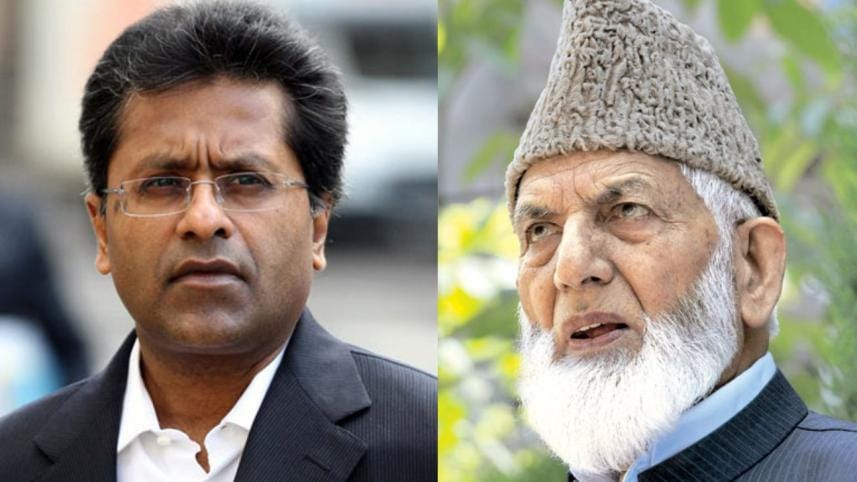Story of two travel documents

INDIA'S major political parties, the Congress and the Bharatiya Janata Party (BJP) have rendered parliament a place of tamasha. They pick up a small matter, hardly worth a mention, and stretch it to a point of debate in parliament. True, they attract the nation's attention but they are also making people more and more cynical about the highest elected bodies.
Take the cases relating to the issuing of travel documents to Syed Ali Shah Geelani, a hardline separatist leader from Jammu and Kashmir, and Lalit Modi, wanted in India in connection with several betting and match-fixing scams relating to Indian Premier League cricket. Both are more or less of similar nature. In the first, Geelani wanted to visit his ailing daughter at Jeddah and, in the second, Lalit Modi wanted to be by the side of his cancer-stricken wife in Portugal.
The External Affairs Ministry, which issues passports, had said that Geelani's "application could not be processed in its present form." The denial of passport to Geelani was said to be because he had not spelt out his nationality in the passport form because he is a subject of Jammu and Kashmir, a "disputed territory." Both the BJP and its Jammu and Kashmir's coalition partner PDP were sharply divided over the issue.
PDP chief Mehbooba Mufti had argued that Geelani should be issued a passport on "humanitarian" grounds while BJP was of the view that he should not be given the travel document till he "apologises" for his anti-national activities. "Only when Geelani accepts that he is an Indian and won't indulge in anti-India activities should the government of India consider his request," said a senior BJP leader. In fact, the party's spokesperson for J&K, Khalid Jehangir, echoed his views. "Geelani is responsible for creating trouble across the Kashmir Valley. His views on Kashmir are known to everyone. I don't think it is in our interest to issue him the passport," he said.
Geelani, who had applied in May for the travel document, has now been issued a passport by the government that is valid for nine months. Now contrast this with what Foreign Minister Sushma Swaraj did to help Lalit Modi obtain travel papers from the British government. She personally wrote to the UK minister to help Lalit Modi as per their country's law. She later explained she helped Lalit Modi on "humanitarian" grounds.
At best, it is a case of indiscretion and she should have been asked to apologise. Instead, the Congress demands her resignation. Not only that, the party creates a rumpus in parliament. When Finance Minister Arun Jaitley announced from the floor of the Lok Sabha that Sushma Swaraj would make a statement and thereafter have a debate, the matter should have ended there. But the Congress demands her resignation first and the discussion later. Apparently, the Congress is short of issues. It cannot ask for the resignation before it is established that Sushma Swaraj was guilty of accepting any pecuniary or some other advantage in allowing Lalit Modi to travel.
True, Sushma Swaraj's husband is Modi's lawyer. But this is the position he has occupied for years. There is no evidence to assert that he got some bonanza or favour before Sushma Swaraj allowed Lalit Modi to travel. The Congress cannot hurl charges without proof. Yet the External Affairs Minister will be well advised not to use her discretion in a way which raises eyebrows. She is a respected leader of the BJP. Maybe because of her socialistic background, she is liberal in her views and actions.
The Rashtriya Swayamsevak Sangh (RSS), known for its hard Hindutva views, is not too happy with her, but the BJP leadership realises that Sushma Swaraj's liberal image has been able to retain the support of those who sit on the fence. Their vote returned the party to power and it was seen for the first time since independence that the Muslim vote is not essential to come to power at the centre.
It is a sad lesson to learn for a country which has taken pride in following a pluralistic line in the face of religious sermons of the Muslim League on the one hand and the Hindu Mahasabha's incitement to the majority on the other. The pitiable condition of the Left is a sad commentary on India's secular credentials.
Part of the remedy is that those who believe in secular ideology must go back to the field and win over the people. It is not that easy but there is no other way. Despite the spell cast by the Muslim League, the Congress never deviated from the policy of secularism during British rule. But its government's functioning over six decades made room for the divide between Hindus and Muslims. And we are suffering the consequences.
Coming back to the issue of Congress tactics to stall parliamentary proceedings, it is unfortunate that its leader Kapil Sibal has justified the obstruction saying it was part of a parliamentary strategy and that the BJP had set the milestone in the past. At the all-party meeting, opposition leader in the Rajya Sabha, Ghulam Nabi Azad, said the Congress will not let the House function unless its demand for the resignations is met. The bravado notwithstanding, a section of the Congress is apprehensive that its strategy may not find much support and that the party may get isolated in parliament.
The fallout of these developments is not healthy. I fear that the entire monsoon session may be a complete washout. This will only sap the energy of India and come in the way of developments. Like what Mahatma Gandhi said, if means are vitiated, the ends are bound to be vitiated. It does not augur well for the country which is a parliamentary democracy.
The writer is an eminent Indian journalist.

 For all latest news, follow The Daily Star's Google News channel.
For all latest news, follow The Daily Star's Google News channel.
Comments